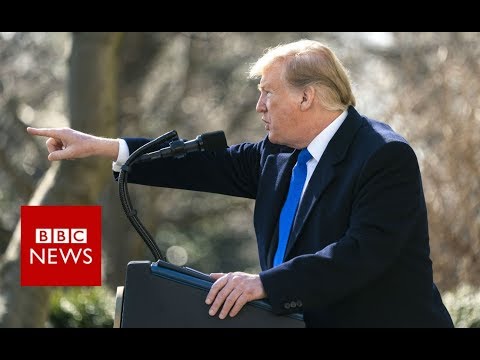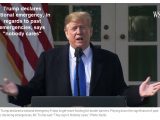
Trump’s Phony Emergency Pushed America a Little Closer Toward a Real Crisis
February 15, 2019Even before Donald Trump announced he was declaring an emergency on the southern border in order to justify throwing $8 billion at building a wall, Republicans were sounding the alarm. Though they were more cautious than their Democratic colleagues, who denounced the move as an illegal power grab, non-Trumpy GOP senators called the idea a "mistake," a "bad idea," and "unnecessary." That might be because the wall is unpopular with the public and not likely to be as effective as Trump claims. It might be because Republicans don't really want the wall, which they could probably have gotten if they had been willing to compromise with Democrats. It might be because Democrats in the House can force the Senate to vote for or against a resolution that would end the state of emergency, putting many GOP senators in a politically tough spot, since they don't want to go against Trump but also don't want to cosign his plan.
Or maybe right-wingers are leery of Trump going down this path because it's clear where it leads. If the situation on the border is a "crisis" at a time when unauthorized crossings are relatively low, literally anything can be a crisis. And the politics of constant crisis will mean even more gamesmanship, more partisan aggression, more rule-bending and norm-breaking, and—in a worst-case scenario—fewer guardrails on the country sliding into actual authoritarianism.
Trump's declaration sparked an uproar from the intellectual branch of the conservative movement, which—at least since the George W. Bush era—has often despaired at the expansion of presidential power. Several writers fretted that Democrats will quickly use this emerging precedent to aggressively pursue their own priorities once they retake the White House. Noah Rothman called it the "crossing of the Rubicon," while Jonah Goldberg predicted it would be a "long-term gift to progressives." Both noted that House Speaker Nancy Pelosi has already mused about declaring a state of emergency over gun violence. The darkest right-wing fantasy probably involves something like President Alexandria Ocasio-Cortez declaring unilaterally in 2030 that airplanes are now banned as part of the Green New Deal Five-Year Plan.
But concern over executive branch overreach seems largely confined to the pundit class. In practice, presidents of both parties, including Barack Obama and Bush, have expanded the powers of the office whenever they could, and Congress has largely let that happen as its own power eroded. Trump's declaration of emergency isn't a break from tradition but the continuation of a long, downward slide into who knows what.
There's always the risk of sounding hyperbolic when talking about that slide. Trump's state of emergency will face a legal challenge, and even if he triumphs there, it doesn't create an easy path for Comrade Ocasio-Cortez to snap her fingers Thanos-like and usher in a new socialist age. The $8 billion Trump is looking to divert from other sources toward a wall is peanuts compared to the $32 trillion Bernie Sanders's Medicare for all proposal might cost over a decade, or the even heftier price tag some have put on the Green New Deal
The problem isn't the nuts and bolts of the declaration, but the rationale behind it. Trump's entire presidential campaign, from the primaries to his eventual razor-thin win, was aflame with apocalyptic rhetoric and drastic, often patently unconstitutional proposals. He called for a ban on Muslims entering the US, gleefully embraced calls to jail his opponent, and praised torture. He hasn't acted on all those impulses (though his "travel ban" clearly grew out of his Islamophobic rhetoric), but he remains fond of extremism in defense of just about anything—on Friday, during his announcement of the state of emergency, he went into a tangent praising China using the death penalty for drug dealers.
Those statements are shocking because normal politicians aren't so crude, but in truth Republicans have for decades been campaigning and governing—and sometimes shutting down the government—as if the end of the world were just around the corner. Trump's declaration of emergency is a natural outgrowth of the philosophy that every lever of power can be used with no limit and that the ends always justify the means—even when the end is a hideous monument to racism. The GOP has treated politics as an emergency for decades, and in an emergency, glass gets broken, rules are ignored, any evil can be excused as necessary.
Conservative Republicans spent the Obama years derailing compromises on immigration, attempting to block the Affordable Care Act rather than working in good faith with Democrats, and doing whatever they could to obstruct the president's agenda, up to and including denying him a Supreme Court appointment. After Trump's election, they refused to include Democrats in conversations around repealing the ACA and rushed through an error-ridden tax cut bill. Meanwhile, Republicans have benefitted from gerrymandering, struck down key portions of the Voting Rights Act, and moved to consolidate their power in states like North Carolina in extremely aggressive, sometimes legally dubious, ways.
This encourages a counter-reaction from Democrats. If Trump's priorities are emergencies, his opposition has to use similar language or risk looking complacent, disinterested, or just bland. He's created a space where the Democratic base is talking about packing the Supreme Court, adding new states to elect Democratic senators, and abolishing the filibuster rules that make it impossible to pass laws without 60 seats in the Senate. If Democrats retake power in 2020, what arguments will their leadership have not to consider those moves, especially with climate change posing a far greater threat than illegal immigration?
You can imagine a kind of whipsaw effect that essentially ends American democracy as we know it: Democrats, in response to Trump, use extreme measures to advance their priorities. Then Republicans win an election and embrace even more extreme measures, and on and on until one party or the other decides to institute laws that make it impossible for the opposition to retake power. That's the who-knows-what that is at the very bottom of the slide we seem to be heading toward. As political scientist Yascha Mounk just wrote in Slate, "Trump lacks the vision or the discipline of most of the authoritarian populists who have successfully bent their countries’ institutions to their will." The danger may not be the current president but who comes after him.
The way out of this bind is trickier to envision. Neither party's base seems to like compromise much in a hyper-ideological era with no unifying sources of facts. But without compromise you can't pass legislation (at least in this current system), giving rise to a situation where the president makes policy and the judiciary doesn't do much besides occasionally tell them "no."
The silver lining, if there is one, is that as Trump just demonstrated, whether we're in an emergency is largely a matter of terminology. It's easy to use the language of crisis, to say that swarms of refugees are swamping the southern border or that America is on the brink of socialism or sliding into the sea or teetering on the edge of a never-before-seen catastrophe. It's harder to identify which one of those things are real, urgent problems and solve them through a regular political process that inevitably involves some compromise. Unfortunately, the president always takes the easy way out.
Sign up for our newsletter to get the best of VICE delivered to your inbox daily.
Follow Harry Cheadle on Twitter.


